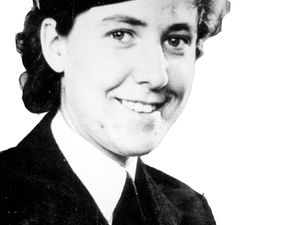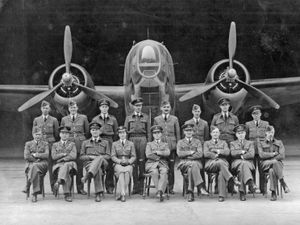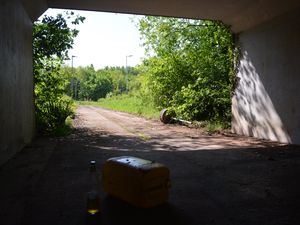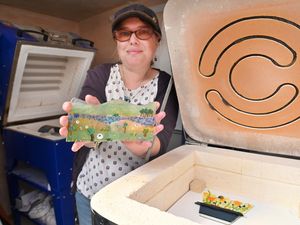Singing schoolgirl knocked on door of stardom
Today, Audley House fete. Tomorrow... the world!
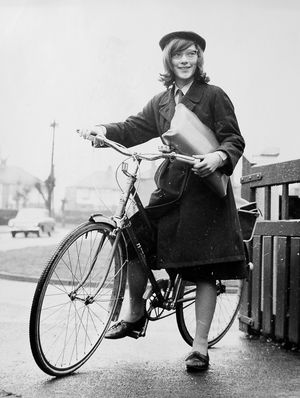
Fifty years ago Newport teenager Lesley Whitehouse was on the brink of a successful international singing career under the name Louisa Jane White, which included being shortlisted as Britain's Eurovision entrant in 1976, and singing a movie's theme song.
But we all have to start somewhere, and 17-year-old Lesley was already well-known locally – and so was asked to open the fete.
She had started early.
"I started out at six years old singing at old folk's clubs and here I am 60 years later, leading a choir at a dementia home," said Louisa, whose daughter Shawn Sanderson obviously inherited her singing genes, as she is a singer and musician.
At the age of seven, Lesley was singing Shirley Bassey numbers for charity at her parents' then home in Dudley (although according to a contemporary Record Mirror she was born in Tipton).
The family later moved to Rose Grove in Wellington, and at the end of 1964 Lesley, still just 13 and a pupil at Wellington High School for Girls, was booked by Terry Heath to sing for 45 minutes on Saturday nights with his resident beat group, The Van-Dels, at Terry Heath's Town House in Wellington, where she earned great applause singing Cilla Black, Sandie Shaw, and Beatles numbers.
With Lesley barely a teenager, parents Harry and Mary insisted on accompanying her to engagements.
The youngster was very much part of the Shropshire pop scene during the 1960s, singing with several groups, and by the time she opened Newport's Audley House fete in 1969 was going solo. The family was living then in Lapworth Way in Newport.
She had been signed up by American impresario Al Crossman, the man who represented stars like Bob Dylan, Peter, Paul and Mary, and Richie Havens.
Under early mentor Tommy Sanderson – a pianist, arranger, publisher, and producer who is supposed to have discovered Lulu – she made her first record.
This was "Caledonia Mission" which was released in April that year, and a string of singles and a solo LP followed. Her genre seems to have been upbeat pop, with a dash of funk and soul.
In time honoured fashion, she moved to London. Apart from her singing talents, Louisa, who signed a contract with MCA in January 1971, also wrote songs herself.
In the early 1970s she was regularly on the airwaves, being featured on the likes of the Jimmy Young Show, and becoming the first artist to be featured by the BBC in a live performance from a cabaret nightspot on Ray Moore's Saturday night, broadcast from Barbarella's in Birmingham.
There was television work, such as a spot with the pop show Lift Off With Ayshea.
In 1972 she won an international song festival in Poland, where she was representing Britain, and there were tours of Germany, Hungary, and Poland.
Club work also kept her busy. For instance, not long after her return from Poland she had a two-week stint at Batley Variety Club, while at Birmingham's Dolce Vita club she was on the same bill as Matt Munro.
She had an unusual claim to fame as she sang the title song to the 1973 movie "Digby, the Biggest Dog in the World." One writer said she sounded like Petula Clark.
And had things gone differently, she might have represented Britain at the 1976 Eurovision Song Contest. She was one of 12 artists who battled it out in the heats.
Introduced to the TV audience by Michael Aspel, she sang "Take The Money And Run," and came a decent fifth.
As Eurovision enthusiasts will probably know, the United Kingdom's chosen entry was "Save Your Kisses For Me" by Brotherhood of Man, which was a rare British winner of the competition.
At the end of that year, the local girl returned home to top the bill at a show at The Village nightspot in Newport, with part of the proceeds going to charity. It had been years since Louisa had last sung in the town, that being with a local group called The Tearaways.
At the time of her return her parents were living in Meadow View Road, Newport.
Where was Louisa living?
"Since her marriage to a recording producer several years ago, she has lived in London," said a story in November 1976, although at the time of Eurovision earlier that year it was said that she "now lives in Wolverhampton."
This inconsistency was nothing new – at different times in 1972 she was variously described as being from Albrighton, London, from Hampton Court in Surrey, and Wolverhampton.
Louisa's recording career faded away in the second half of the 1970s.
We're in contact and hoping to hear from her about what came next in her life, but in any event it's clear that she had fond memories of her Shropshire beginnings, because in 2015 she came up from London for a reunion of old pals from the county's 1960s pop scene.

